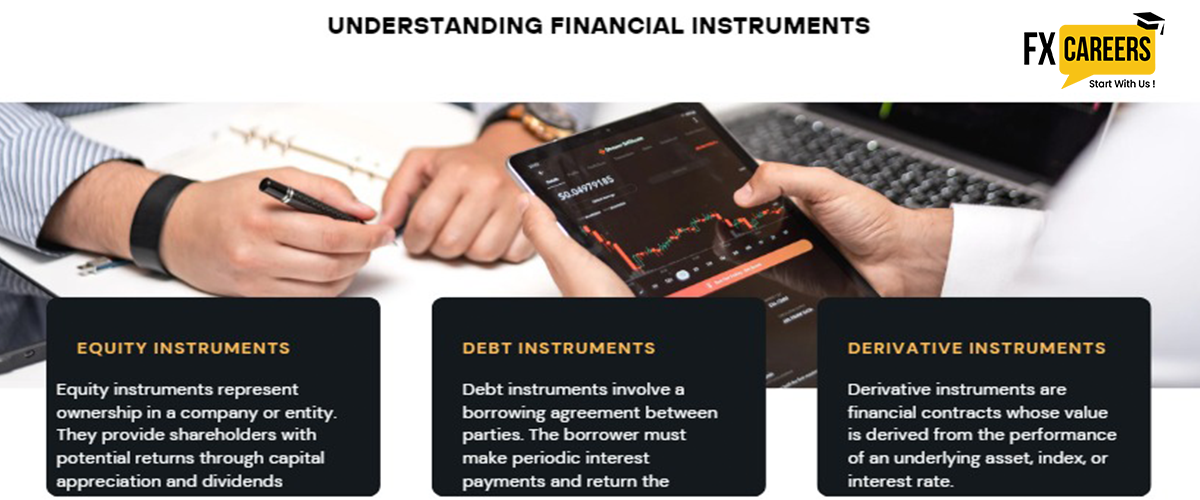FXCareers Blogs
 Go Back Home
Go Back Home

 20-08-2024
20-08-2024 5 minutes of Reading
5 minutes of Reading
Understanding Financial Instruments: Your Guide to investing
Understanding how money works is essential for making smart investment decisions. Financial instruments are important tools that help you invest in different markets. While they might seem complicated at first, learning about them can help you grow your wealth and secure your financial future. This article will explain the basics of financial instruments and how you can use them to achieve your goals.
Before learning about specific financial instruments, it's important to understand the market where they are traded. The financial market is made up of different parts, each with its own features.
So what are the financial Instruments?
Monetary contracts that can be made, traded, amended, and settled are known as financial instruments. They represent an asset to one party and a liability or equity instrument to another
Types of Financial Instruments
Financial instruments are classified into several categories based on their characteristics and the markets in which they are traded.
- Equity Instruments
- Debt Instruments
- Derivative Instruments
- Hybrid instruments
- Money Market Instruments
Equity Instruments: Equity instruments represent ownership in a company or entity. They provide shareholders with potential returns through capital appreciation and dividends. They often come with voting rights and other privileges associated with ownership.
- Stocks: Stocks represent ownership in a company. Shareholders may receive dividends and benefit from capital gains
- Equity Mutual Funds: These funds pool capital from multiple investors to buy a diversified portfolio of stocks, offering diversification and professional management.
Debt Instruments: Debt instruments involve a borrowing agreement between parties. The borrower must make periodic interest payments and return the principal amount at maturity. These instruments are used by governments and corporations to raise capital.
- Bonds: Bonds are long-term debt securities issued by governments or corporations. Bondholders receive principle repayment at maturity along with monthly interest payments.
- Debentures: Debentures are unsecured debt instruments based on the issuer’s creditworthiness rather than specific collateral.
Derivative Instruments: Derivative instruments are financial contracts whose value is derived from the performance of an underlying asset, index, or interest rate.
- Options: Options are agreements that grant the right, but not the responsibility, to purchase or sell a good before a given date at a given price.
- Futures: Futures are contracts that obligate the buyer to purchase, and the seller to sell, an asset at a future date for a predetermined price.
- Swaps: Swaps are contracts where two parties exchange cash flows or financial instruments, such as interest rates or currencies.
Hybrid Instruments: Hybrid instruments combine features of both equity and debt instruments. They offer elements of ownership and borrowing, often with complex terms and conditions.
- Convertible Bonds: These are bonds that can be converted into a specified number of shares of the issuing company, combining features of both debt and equity.
- Warrants: Warrants provide the right to purchase a company’s stock at a specific price before expiration, often attached to other securities like bonds.
Money Market Instruments: Money market instruments are short-term, highly liquid financial instruments used to manage short-term funding needs. They include instruments issued by governments and corporations to secure short-term capital.
- Treasury Bills: Short-term government securities with maturities ranging from a few days to one year, used for managing short-term funding needs.
- Commercial Paper: Unsecured short-term debt issued by corporations to meet short-term financial requirements.
Conclusion:
Understanding financial instruments is crucial for making informed investment decisions. By learning about the different types of financial instruments—equity, debt, derivatives, hybrids, and money market instruments—you can choose the ones that best align with your investment strategy. Equip yourself with this knowledge to effectively manage your investments and work towards achieving your financial goals.

Want to Expert in Trading?
One Step a Way
Start building your trading skills for a successful financial future.
Get Started

